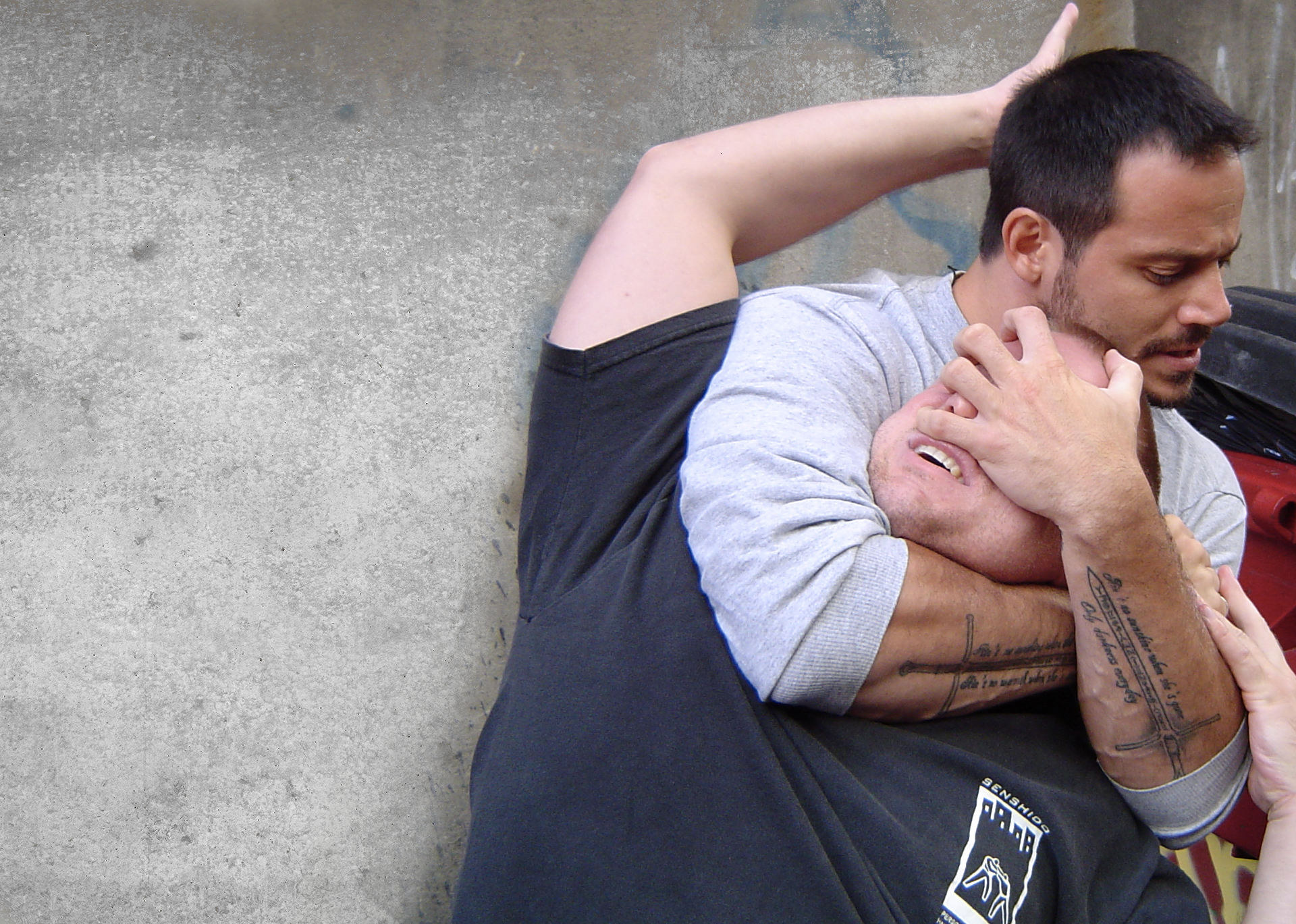"Once the combative mind frees itself of the obstructions from necessity (primarily caused by the fixation with technique), it will evolve to its highest state of absorption and enhance its moment to moment capabilities with refined accuracy. The 'fight' from its earliest point, to its state of incompleteness is so vast that any attempts at locking onto specifics deludes our chances of survival from the minimal... to the extreme."
- Richard Dimitri
This was part of a reply I gave someone on my forum a while back. I got several emails telling me how profound and enlightening these words were to some and others asked me to explain the quote to them.
Let's take the first part of the quote and work from there.
"Once the combative mind frees itself of the obstructions from necessity (primarily caused by the fixation with technique), it will evolve to its highest state of absorption and enhance its moment to moment capabilities with refined accuracy."
The majority of combative systems today, traditional and modern alike rely either solely on or 90% of the time on physical tactics. It's either about grappling or striking, or about which 'technique' is most efficient under which attacks etc.
When the fight isn't bound by rules, codes or previous agreements such as sparring or athletic events, then human behaviour becomes the primary source in which information is filtered. The state of mind in which the individual is in at the moment, based on the time and events of the day or week's occurrences, will have a predominant effect in his reactions in that moment.
We cannot change an individual's core behavioural components but it is possible to activate quicker tactical reactions to behaviourally rooted situations. 'Freeing the combative mind' of necessities implies being open to spontaneous improvisation. Each element of a confrontation will require a different tactic.
For instance, fighting or defending against an unarmed man requires different tactical implementations then fighting or defending yourself against two armed men. If you possess but a solidified technical response then you will be consistently prompted by your 'mind' to perform that response whether the situation calls for it or not. If the situation presented happens to be outside of your combative comfort zone then you possibly may either freeze up or radically fail at successfully defending yourself.
When sparring or competing, we are in a 'prepared' state of mind. When exiting a funeral of a loved one who passed away at a sudden early age, we are not. If unfortunately confronted during such a traumatic event, our state of mind and perception time will be much slower and more difficult to shift. Anger may inevitably take over but it won't be controlled. Emotional inertia will have an impact on both your mental state and physical retaliation.
For example, a Russian martial arts expert was walking his wife home one evening in NYC from the subway when muggers killed him. "Oleg Bosenko, 38, used his martial arts training to kick the gun from one thug's grasp and scuffled with the man, but the thief's female partner reacted quickly. She didn't hesitate as she blasted the hard-working immigrant with two shots from her own .380-caliber pistol, police said."
No doubt had it been a one on one situation, this man would have probably survived. It was his training that was faulty. His immediate reaction was a physical one fuelled by emotional inertia rather than tactical thinking. His awareness failed him, he had no pre-contact psychological skills, and there was no attempt at defusing or de-escalating the situation. His physical arsenal failed him. His situational awareness also failed him. His intuition however, was right on because (as the story explained) he walked his wife home all the time due to the very fact that he was concerned about something ever happening to her.
In a nutshell, if you're fixating or limited within the factions of a 'style' or 'system', anything that happens outside that realm will not necessarily be handled properly. Majority of these sport systems do not take into consideration behavioural elements or tactical awareness.
It's not about a take down, an arm bar, a choke, a kick or a 3-punch combination, techniques are INCIDENTAL. Emotional inertia and behavioural filtration are the delivery system that allows these technical applications to succeed. The wrong tool at the wrong time can get you killed.
We're not talking about the drunk at the local watering hole either. A fight is just a fight, you win, you lose, an ego is bruised, a nose is broken, and it's over. This is the commonness that creates presumption that sport combat is fully functional... under these types of 'common' situations, sport combat is highly functional. But what if the level has been upped a couple of notches?
Majority of sports fighters will state the impossibility of defense against such situations. I really like what Paul wrote on Sammy's forum regarding that issue. He made reference to Cicero's 6 mistakes of man, one of them which states that insisting that something is impossible just because YOU cannot accomplish it. It really irks me when people impose their failures and limitations onto others... "If I can't do it, no one can." This is the statement of a loser, plain and simple. If every innovator, creator, scientist etc. believed these losers then we'd still be in the dark ages. Thank God some people don't adopt other people's failures as their own.
Let's examine the second part of the quote.
"The 'fight' from its earliest point, to its state of incompleteness is so vast that any attempts at locking onto specifics deludes our chances of survival from the minimal... to the extreme."
As stated above, a fight isn't purely a physical phenomenon, it is one that involves psychological warfare, emotional contingencies, tactical and situational awareness as well as intuitiveness and an ability to read the 'future' based on an accurate perception of the past and present.
A 'fight' per say, only ends when both parties agree that it is over and that bygones will be bygones. Other than that, the 'fight' or situation isn't necessarily over. Even if you killed your opponent. For example: An acquaintance I used to go to college with had gotten in a fight outside a bar. He and three of his friends beat a Vietnamese guy to a pulp. Once the man was completely incapacitated, they left him out cold lying in his bloody mess outside the club and called it a night. A few months later, my acquaintance was walking out of a movie theatre with his girlfriend, walking hand in hand. The Vietnamese guy he beat up month prior was also there and recognized him. This time however, the Vietnamese guy pulled a knife out, rushed my acquaintance and his girlfriend from behind and began stabbing them both in the back several times then ran off. My acquaintance survived but had to spend a number of weeks in the hospital. His girlfriend didn't. His girlfriend passed away because of a fight he got into a few months earlier. His mistake was assuming the fight was over the night he beat the guy up.
There are several questions one has to ask himself after a fight.
Will my opponent seek revenge?
If I kill him in self-defense, will his family, friends seek revenge?
Is my opponent 'connected'? Does he have 'friends' in high places?
Were there witnesses? If so, what did they see?
Will charges be placed against me?
Do I know what my legal rights are?
Do I know what to say and what not to say to a LEO, a lawyer, a judge, a jury?
Do I already have a criminal record? How can it be used against me?
The answers to these questions are crucial and require strategic implementation. If you survived the encounter and no LE was involved afterwards, there are several steps that need to be taken. For one, elevating ones state of awareness to code red for at least 3 months. Avoiding the neighbourhood and/or surroundings where the encounter took place. Making a few changes to your look (growing or cutting hair, growing or shaving facial hair, not wearing the particular clothes or similar looking clothes that were worn on the day of the encounter - nothing that could trigger a memory of the evening to your opponent). Paying closer attention to anyone or anything out of place (profiling people and environments).
This may sound paranoid but I bet you my acquaintance would have loved to know this information back then. Hindsight is always 20/20.
Imagine the following: You're out with your girlfriend (fiancé, wife) and this guy starts to hit on her in front of you. She politely declines and he insists, saying "Why don't you leave this fag and come with me so I can show you what a real man is like." And he shoves you off your stool where you lose your balance and fall to the floor. You get back up and confront him and before you can go pre-emptive, his friend grabs you from behind and beat the crap out of you to the point where you need re-constructional surgery.
Would you not seek revenge? Most would. Especially the high ego, insecure type (you know the type… most men).
Each and every physical altercation whose roots aren't sport oriented has a pre-contact stage, a physical stage and lingering aftermath. One must be prepared for all 3 eventualities. As a reality based system, at Senshido, the first thing we do is help redefine an individual's belief system into one that is more congruous to their objectives of survival. We then impart them with the necessary skills (profiling, situational and environmental awareness, intuitive radar, pre contact cues and indicators, tactical threat assessments etc.) to avoid a potential threat or confrontation. Then we arm them with pre-contact psychology (fear and stress management, adrenal stress condition, physiological and biological results, enhancing perception time, decreasing reaction time, etc.) in order not to necessarily move 'faster' than the opponent, but earlier. The third step is the physical portion; we cover all ranges of combat (contrary to popular belief, we're not all about eye gouges and groin strikes). We rely heavily on athletic ability, conditioning the students through functional combative strength training. We cover tool and target development in the kicking, boxing, close quarter combat, grappling and ground fighting game. I separate grappling and ground fighting because you can grapple standing up. All the ranges are then worked together through (if I may quote Matt Thornton here) 'alive' drills, sparring and scenario based training.
I fundamentally believe in Matt's approach at training 'alive'. If you're not sweating, bleeding, invoking stress on a physical, psychological and emotional level in your training, then you are not training for reality. The last step (not necessarily in training time but for explanation purposes) is to teach them the legalities of their actions. It is important to look at the legal, moral and ethical aspects of self-preservation as you don't want to end up being someone's bitch in prison because you put some drunk in a coma through excessive force.
All these elements are pieces of a complete puzzle. When it comes to survival, you don't want to have a chink in your armour.
Train diligently and intelligently.
Richard Dimitri




0 Comments
Leave a comment